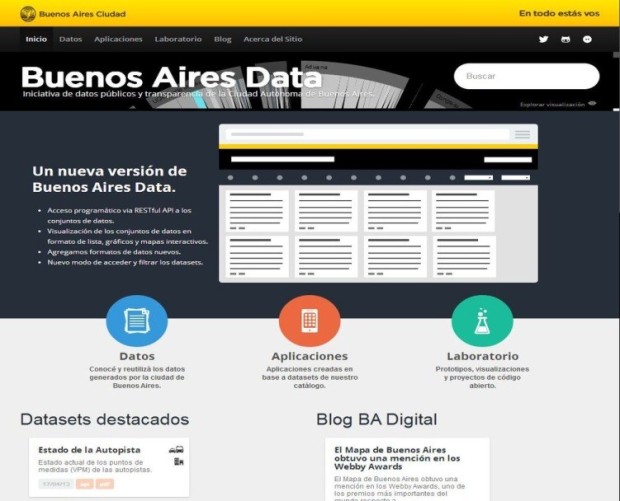written by Dieter Cavalleri, Embassy of Switzerland in Argentina
Data-driven strategies in the market – The big data and analytics market is growing fast in Argentina. After an education phase in 2013, big data is gaining increasing attention from the industry and the Government, which consider it to be an important opportunity for business and research. 
As revealed by a survey of 1,139 IT decision-makers in 2015, “interest in big data continues its steady rise. More than half (53%) of the respondents are currently implementing or plan to implement data-driven projects within their organizations in the next year — an increase of 6 percentage points from 2014 — and a further 8% are considering doing so. Organizations’ approach to data-driven projects varies, sometimes significantly, depending on size and industry.” Furthermore, nearly one in three respondents report that their organization’s data-driven initiatives have improved their decision-making and/or their planning and forecasting. However, companies are still scrambling to manage ongoing data growth even as they pursue projects designed to generate more value from the data they already have. For many, even keeping pace remains a challenge.[1] Another limiting challenge is the growing “skill gap” as more and more employees with data analysis and data management skills are needed. [2] In general, there is a need for further trainings on “big data” in order to generate a critical mass of professionals in Argentina.[3]
Despite these limitations, “big data” continues expanding to all the industries; from agriculture to banking, but also telecommunications with companies like Telefónica de Argentina which implemented IBM solutions (PureData System for Analytics) to manage close to 20 million customers (fixes and mobile phones) and link them to data coming from the Internet and social networks. For the City of Buenos Aires, the implementation of SAP (Systems, Applications, and Products for Data Processing) was a solution to pass from paper-management to automation. Implemented four months ago, the platform HANA helps manage city resources which exceed 700,000 assets, including street-lamps, parks, bus stops, drainage systems, buildings and bridges. Thanks to HANA, the city Government can process in real time claims in social networks (through its Twitter account) and link sensors information (located in the LED street-lamps– with antennas transmitting the information to HANA), as well as in drainage systems which measure rainfalls and flow rates) with cleaning plans.[4]
“Big Data” National Strategy
Work on the definition of a national strategy around “big data” began in 2013 with the first edition of the “Jornadas de Definición Estratégica en Big Data” (Strategic Definition in Big Data Days) organized by the National Ministry of Science, Technology and Productive Innovation and the Sadosky Foundation of IT Investigation and Development. The event intended to provide inputs for the development of a roadmap for the implementation of policies aimed at addressing national challenges in this area. It brought together a group of experts comprised of representatives from the Government and from academic and business fields.[5] This event allowed confirming the existence in Argentina, of a group of relevant stakeholders that are currently working on this theme; the availability of inputs and resources such as data and communication infrastructure; and the need for enhanced efforts in the formation of new professionals. The working group also identified the need for incentives and projects from the National State which could drive innovation, and therefore boost emerging companies and generate new ones, while also allowing for synergies between fields to take place.
As the development of “big data” is considered a question of national and regional sovereignty, the Argentinian national strategy currently aims at transforming the country into a relevant actor in this field within the next five years. Despite its growing importance in the world, big data remains in early development stages, which makes it easier for Argentina to position itself as a regional leader in the big data revolution. The result of this encounter led to the adoption of a “strategic roadmap for Data Science in Argentina 2013-2018”, which includes all relevant stakeholders. This strategic roadmap involves building a data platform comprised of local data and capacities in order to develop a school of thought in relation to big data. The construction of this platform will strengthen the advances in science and technologies, enable the development of services for the economy and the society, and lead to growth and creation of new knowledge companies and of international market competitiveness. This platform should necessarily bring together stakeholders from the academic, private and public sectors, since big data is naturally multidisciplinary. The originality and unicity of this platform lies in the use of its own data and in its specific objectives and applications stemming directly from the argentine reality. An important part of this platform will be comprised of geolocated data coming from strategic areas for the country (natural resources, economic activity, health, education, security, defense, innovation…) to which biological, bioinformatics data and e-government data will be added, while preserving in all circumstances, their privacy and security. This will be combined with the promotion of institutional and infrastructure development of training centers in order to effectively reduce the “skills gap” currently present in the “big data” market.
Other drafted initiatives consist in creating a National Bioinformatics Platform, a National Centre for Data Science, a national cloud, a cluster of “big data” companies, Data Science laboratories, as well as a postgraduate training in Data Science (as currently the University of Buenos Aires only offers a master degree in Data Mining and Knowledge Discovery). From the projects which have already been implemented, it is worth mentioning the creation of the “Palenque Platform” by the Sadosky Foundation; a geolocated agro-data space in Argentina – the single one based on a public platform. It is meant to provide technological solutions to agricultural producers based on big data, and to help them increase their productivity through precision farming (sensors, smart planting and irrigation etc.) and weather forecasts.[6]
The Sadosky Foundation is also pursuing other initiatives with companies from different sectors, such as the Banco Hipotecario (mortgage bank). They recently signed a Convention for collaboration in big data research, which will have two lines of action: provide banking services to more sectors of the population and establish optimized decision models for credits cards customers. Currently it has close to one million customers handling more than 10 million transactions per month, from which many data can be extracted.
Open data
The experience of Open Government was first implemented in the City of Buenos Aires in early 2012 through its web portal “Buenos Aires Data” – where it publishes all its digital content under a creative common license which allows it to be used for free with proper attribution. The open data catalogue allows users to visualize the data, examine apps that have been created using the data and even includes a design lab for posting app ideas. The Government publishes substantial data sets on diverse topics such as health, education, transit, and culture among others. As of January 2015, the portal contained 111 datasets and at least three application programming interfaces – including one, which measures traffic loads on the motorway in real time. [7] The website also embodies the principles of openness in its design as it was built implementing CKAN, an open source data management system, and its code is available for reuse via GitHub.[8]
Figure 1: Buenos Aires open data catalogue
Since the implementation of this program, various strategies have been carried out for the co-creation and development of tools to support civic, democratic and economic engagement. To promote the use of the data, the open Government team has organized hackathons (BAHackaton) and mobile apps competitions (BA Apps BA).[9] The events drew many developers, but also participants from media and civil society, creating therefore a real community.
The Government of Argentina has also indicated its willingness to apply the principles of open government. In order to achieve this objective, it created a working group on open government which formalized the creation of a National Portal of Public Data in 2013.[10] The working group is currently working on a national action plan 2015-2017.[11]
_________
[1] http://www.cxo2cio.com/2015/07/2015-big-data-analytics-survey-insights.html
[2] Ibid.
[3] http://triton.exp.dc.uba.ar/datamining/files/Charlas_y_Paneles/p1_efeuerstein.pdf
[4] El Cronista. “IT Business, El Poder de la Economía de Datos”, 18 August 2015.
[5] http://www.fundacionsadosky.org.ar/grandes-datos-grandes-oportunidades/
[6] http://triton.exp.dc.uba.ar/datamining/files/Charlas_y_Paneles/p1_efeuerstein.pdf
[7] http://www.opendataresearch.org/dl/symposium2015/odrs2015-paper28.pdf
[8]http://www.gobiernolocal.gob.ar/sites/default/files/Jolias_Lucas_open_Data_a_nivel_local_en_Argentina_Transparencia_o_innovacion_democratica_Panel_023.pdf
[9]http://www.gobiernolocal.gob.ar/sites/default/files/Jolias_Lucas_open_Data_a_nivel_local_en_Argentina_Transparencia_o_innovacion_democratica_Panel_023.pdf
[10] http://blogs.lanacion.com.ar/data/datasets/se-presento-el-portal-nacional-de-datos-publicos/
[11] http://www.gobiernoabierto.gob.ar/novedades/participa-del-ii-plan-de-accion-2015-2017-de-la-republica-argentina_n249
